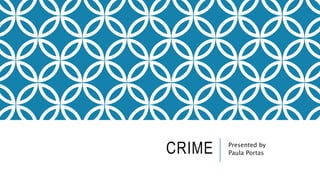
Crime
- 1. CRIME Presented by Paula Portas
- 2. CRIME is an unlawful act punishable by a state or other authority. is an act harmful not only to some individual but also to a community, society or the state ("a public wrong"). Such acts are forbidden and punishable by law.
- 3. OVERVIEW When informal relationships and sanctions prove insufficient to establish and maintain a desired social order, a government or a state may impose more formalized or stricter systems of social control. With institutional and legal machinery at their disposal, agents of the State can compel populations to conform to codes and can opt to punish or attempt to reform those who do not conform.
- 4. Authorities employ various mechanisms to regulate (encouraging or discouraging) certain behaviors in general. Governing or administering agencies may for example codify rules into laws, police citizens and visitors to ensure that they comply with those laws, and implement other policies and practices that legislators or administrators have prescribed with the aim of discouraging or preventing crime. In addition, authorities provide remedies and sanctions, and collectively these constitute a criminal justice system. Legal sanctions vary widely in their severity; they may include (for example) incarceration of temporary character aimed at reforming the convict. Some jurisdictions have penal codes written to inflict permanent harsh punishments: legal mutilation, capital punishment or life without parole.
- 5. Usually a natural person perpetrates a crime, but legal persons may also commit crimes. Conversely, at least under U.S. law, nonpersons such as animals cannot commit crimes.[6] The sociologist Richard Quinney has written about the relationship between society and crime. When Quinney states "crime is a social phenomenon" he envisages both how individuals conceive crime and how populations perceive it, based on societal norms.[7]
- 6. ETYMOLOGY The word crime is derived from the Latin root cernō, meaning "I decide, I give judgment". Originally the Latin word crīmen meant "charge" or "cry of distress."[8] The Ancient Greek word krima (κρίμα), from which the Latin cognate derives, typically referred to an intellectual mistake or an offense against the community, rather than a private or moral wrong.[9] In 13th century English crime meant "sinfulness", according to etymonline.com. It was probably brought to England as Old French crimne (12th century form of Modern Frenchcrime), from Latin crimen (in the genitive case: criminis). In Latin, crimen could have signified any one of the following: "charge, indictment, accusation; crime, fault, offense".
- 7. DEFINITION England and Wales Whether a given act or omission constitutes a crime does not depend on the nature of that act or omission. It depends on the nature of the legal consequences that may follow it.[10] An act or omission is a crime if it is capable of being followed by what are called criminal proceedings.[11][12]
- 8. HISTORY Scotland For the purpose of section 243 of the Trade Union and Labour Relations (Consolidation) Act 1992, a crime means an offence punishable on indictment, or an offence punishable on summary conviction, and for the commission of which the offender is liable under the statute making the offence punishable to be imprisoned either absolutely or at the discretion of the court as an alternative for some other punishment.[14]
- 9. Sociology A normative definition views crime as deviant behavior that violates prevailing norms – cultural standards prescribing how humans ought to behave normally. This approach considers the complex realities surrounding the concept of crime and seeks to understand how changing social, political, psychological, and economic conditions may affect changing definitions of crime and the form of the legal, law-enforcement, and penal responses made by society. These structural realities remain fluid and often contentious. For example: as cultures change and the political environment shifts, societies may criminalise or decriminalise certain behaviours, which directly affects the statistical crime rates, influence the allocation of resources for the enforcement of laws, and (re-)influence the general public opinion.
- 10. LABELLING THEORY The label of "crime" and the accompanying social stigma normally confine their scope to those activities seen as injurious to the general population or to the State, including some that cause serious loss or damage to individuals. Those who apply the labels of "crime" or "criminal" intend to assert the hegemony of a dominant population, or to reflect a consensus of condemnation for the identified behavior and to justify any punishments prescribed by the State (in the event that standard processing tries and convicts an accused person of a crime).
- 11. NATURAL-LAW THEORY But John Austin (1790–1859), an early positivist, applied utilitarianism in accepting the calculating nature of human beings and the existence of an objective morality. He denied that the legal validity of a norm depends on whether its content conforms to morality. Thus in Austinian terms a moral code can objectively determine what people ought to do, the law can embody whatever norms the legislature decrees to achieve social utility, but every individual remains free to choose what to do. Similarly, Hart (1961) saw the law as an aspect of sovereignty, with lawmakers able to adopt any law as a means to a moral end.